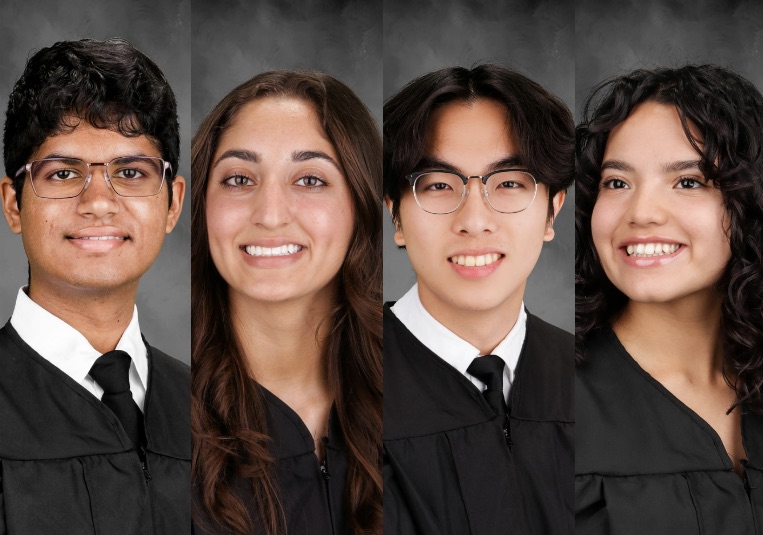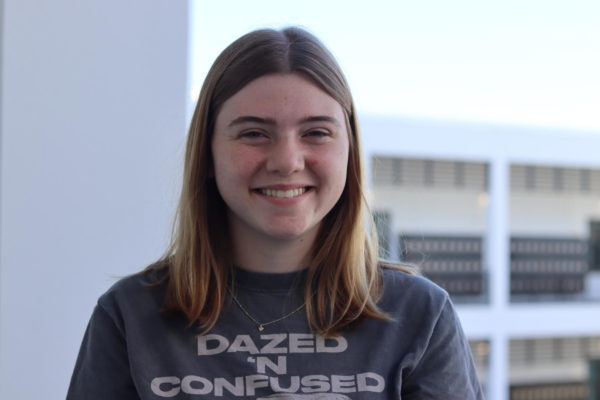The Valedictorians and Salutatorians of the Class of 2024 were released on Tuesday, Feb. 20. Knight Writers has compiled a list of questions to ask the top students of this year’s graduating class.
Q: Has becoming Valedictorian/Salutatorian always been a goal for you? What did it take to achieve this goal?
Vikram Sambasivan, IB Valedictorian: “While achieving this title is a great honor, it has never been my goal. As many of my peers probably realize at this point, especially if they have any extracurriculars, pointlessly running up one’s GPA for a ranking is not worth it. My parents have always tried to instill in me a sense of curiosity along with a love of learning. It was this which inadvertently brought me to this position. However, I would be remiss if I did not state that this journey would simply not have been possible without the guidance and mentoring from our amazing teachers and administration here at Robinson.”
Jazmine Afridi, IB Salutatorian: “Being salutatorian did not become a goal until recently. Freshmen year, I began taking classes that I was interested in. My GPA increased on its own and then I made it a goal of mine. Honestly, the only thing I did to achieve this was take classes I was interested in, through dual enrollment.”
Anthony Zheng, Traditional Valedictorian: “It wasn’t my goal at first as I was just taking classes that I liked and taking classes for college credit, but when I realized I was in the running, then I started to pursue it more.”
Dayana Dominguez, Traditional Salutatorian: “Yes, graduating at the top of my class was always a goal. I had to take some hard classes and keep pushing even when I didn’t want to do the work. It took self-discipline and learning.”
Q: Was becoming Valedictorian/Salutatorian worth the hard work and any possible sacrifices?
VS: “This is a difficult question to answer. If achieving this title was my only goal, then no, the work I had to put in would not have been worth it. However, taking additional classes out of pure curiosity allowed me to actually try to learn concepts rather than just chasing grades; this led me to not only satiate a desire to learn, but also broaden my own perspective and create connections between subjects. This experience made me more well-rounded, and that is something that, to me, is priceless. It taught me to be disciplined, for sure.”
JA: “Yes, it was worth the hard work. This is because I didn’t take all these classes in order to become salutatorian. So, essentially, the work would’ve been put in even if I didn’t achieve this.”
AZ: “I wouldn’t say the title itself is worth as much as the standards I set for myself, in which case yes I think it was worth it to not cheat myself and let myself fall below my own standards.”
DD: “The hard work and sacrifices were definitely worth it, it feels good to be able to celebrate that hard work and I’m excited to give a speech at graduation. I’m most grateful for the growth it has given me.”
Q: How were you able to balance academics, extracurriculars and your social life?
VS: “I have never really thought about my life in those distinct categories. Coming into high school, I was feeling a bit frustrated with the rigid nature of middle and elementary-level education that I had experienced thus far, so my mentality shifted from ‘I need to get a good grade’ to ‘I’m just going to do whatever I want.’ So that’s pretty much what I’ve done. If there’s some non-academic thing I want to do, I just go for it; an opportunity that seems fun or interesting, I just go for it. I try to blend all of these different aspects of life (academic, extracurricular, social) into everything that I do; this is something which I have found to be very sustainable and which I believe will help me find fulfillment in my professional life.”
JA: “As captain of the soccer team and Mu Alpha Theta, balancing extracurriculars with academics and my social life meant being on top of things, always. There were many late nights and eventually, I learned how to perfect time management.”
AZ: “I was able to balance my academics, extracurriculars, and social life pretty well as I tried not to procrastinate and managed my time wisely. Another habit that helped me was how I gave my full attention in the classroom so that I wouldn’t have to study as much nor finish as much work outside of school.”
DD: “I balanced it all by planning and prioritizing. But more importantly, by doing things I enjoyed. When it got hard I journaled and played the violin. It’s important to keep doing what makes you happy as you pursue other goals.”
Q: What message would you share with underclassmen who are interested in pursuing the same path?
VS: “Don’t try to follow the same path as me or anyone else. It’s good to have role models for general guidance, but ultimately, you have to follow your own path or else it’s just not worth it. Becoming Valedictorian is just a title; it is not any indication of future life outcomes or an accurate predictor of whatever one defines as success. Just focus on pursuing your own goals out in the world and speaking to others in that area; that is the most valuable thing I have done, one I would recommend to others.”
JA: “If you are going to take extra classes, take classes you genuinely enjoy. It will make not only your high school experience better, but you won’t dread the work as much either. This is especially important when you’re a part of lots of extracurriculars as well.”
AZ: “My message to underclassmen that are pursuing the same path is to not let yourself become too comfortable where you are because then you’ll be inclined to be complacent. Challenge yourself by taking harder classes, trying new sports, joining new clubs and getting used to being uncomfortable.”
DD: “My advice is to find what it [everything] means to you. Do it all with purpose, with intent. Find meaning in everything. Think about what you want to put forth in the world. Stay hungry. Your potential comes from how bad you want it. How hard are you willing to work for it?”
Q: What are your plans for the future?
VS: “I have always been curious about the medical field, however, during my high school years I developed a strong passion for journalism. In the future, I would like to combine both Journalism and Medicine, using my writings as an insider in the medical industry to change the standard of patient care and physician treatment. Eventually, I would like to influence this change through policy as well. I would also like to acknowledge those who helped me develop the skills and traits which led me to this path: my teachers going back to elementary school encouraged me to become a problem-solver and think through obstacles which I face, my coaches at Team Tampa Rowing for teaching me the self-discipline I need to stay focused throughout my life, the amazing administration at all of the school I have attended for crafting a nurturing educational environment and last, but not least, my fellow managing editors – Charlotte Stone and Cecilia Cheng – whose support has been crucial in developing my passion for Journalism.
JA: “All of my college decisions will be released beginning in mid-March. But, as of now, I plan on majoring in biology and going into medicine.”
AZ: “My plans for the future are to pursue a computer science major at a university and build a career in the IT field working with AI or something similar.”
DD: “I plan on building a life I can be proud of. Sneak peek: giving back to my parents, becoming a neurosurgeon, honoring myself and my dreams. I’m going to be doing school for a long time… I’ll continue working hard and putting forth my best effort.”


